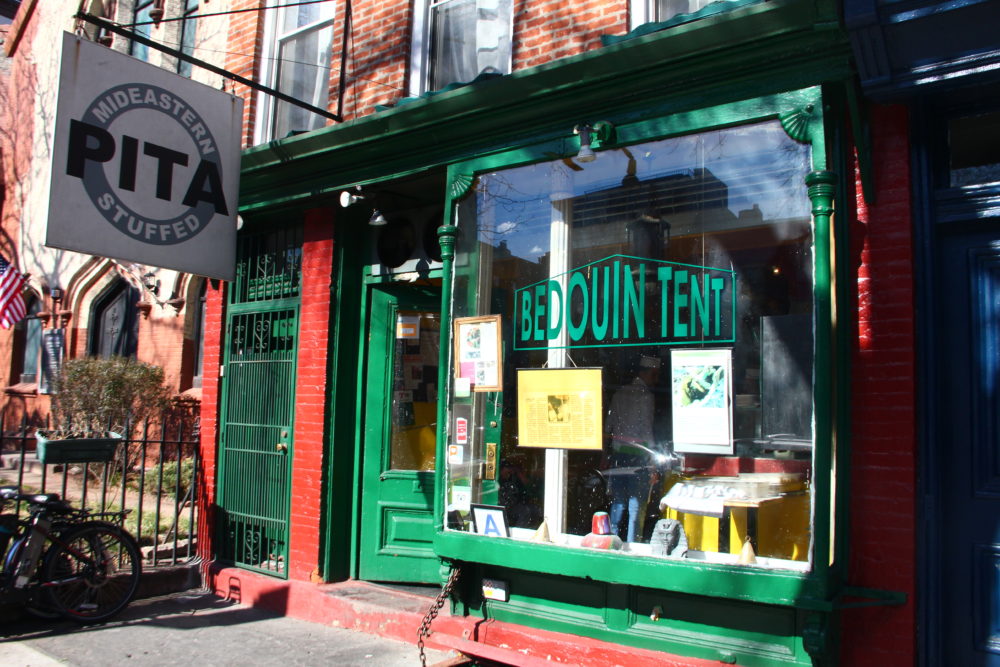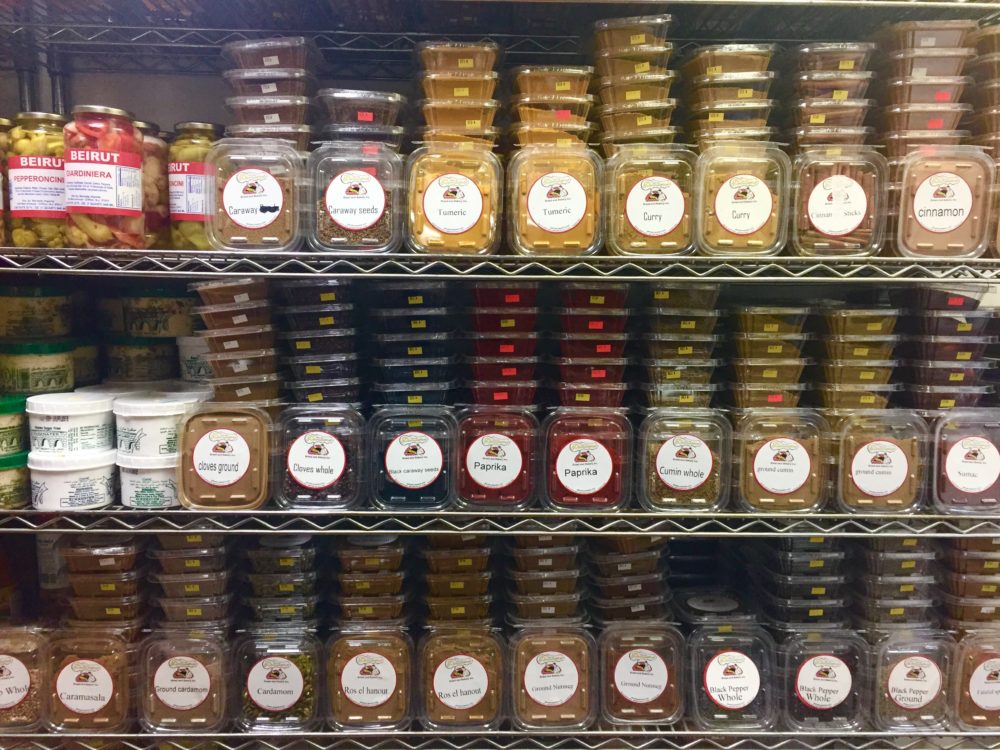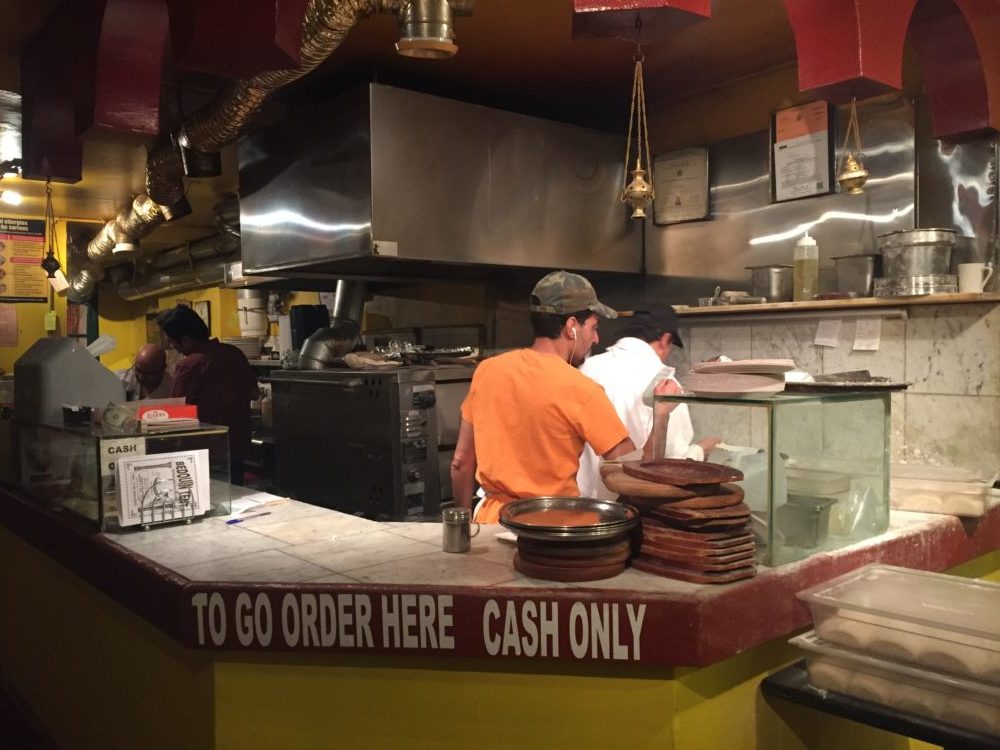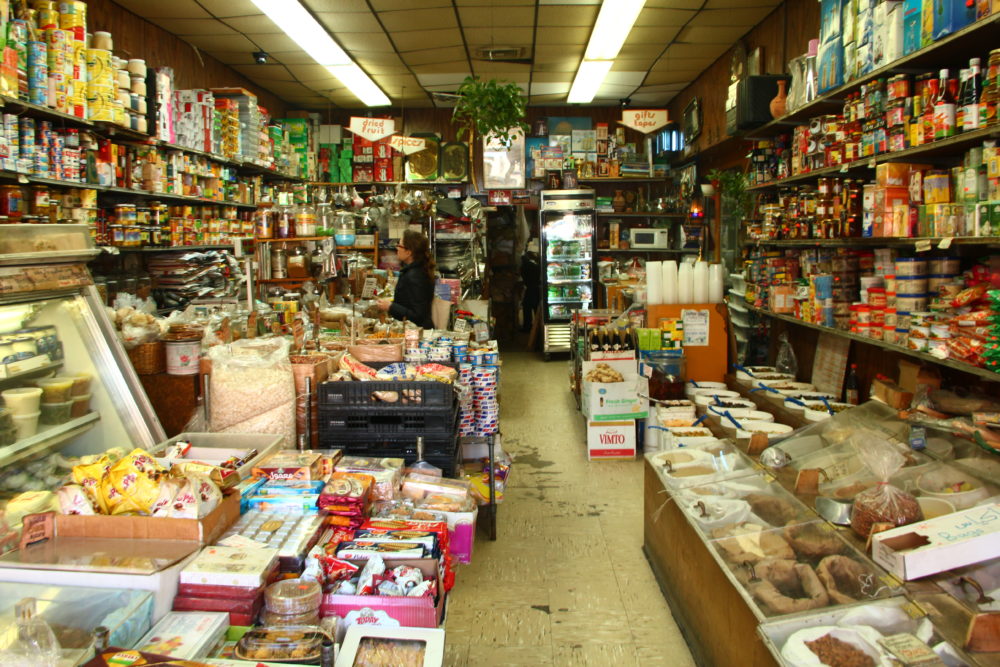How Brooklyn’s Middle East Survives Against the Odds
In an age of anti-Muslim politics, the businesses of Atlantic Avenue have drawn fresh support from neighbors
Bedouin Tent is one of a string of Middle Eastern businesses whose history on Atlantic Avenue goes back many decades (All photos by Angelica Frey)
Ghassan Matli, owner of Atlantic Avenue’s Damascus Bread & Pastry, offers his recommendation for the best way to savor the signature pastry of his 86-year-old store: “At 8 o’clock, you start with the walnut baklava; at 9, pistachio; 10, almond; 11, cashew; 12, cheese; 1, raspberry; 2, strawberry; 3, apple; 4, blueberry; 5, walnuts again.” He sells a flavor for every hour of the day and then some: 21 types of baklava and 14 varieties of spinach pie. The sprawling selection of Middle Eastern breads, dips and hard-to-find spices draw loyal customers to his store at 195 Atlantic Ave. from all over the five boroughs and beyond.

The colorful tableau of fruits and spices at Damascus Bread & Pastry shop
Damascus is one of the dozen stores of Brooklyn’s “fertile crescent,” a string of Middle Eastern eateries and other shops situated on Atlantic Avenue between Brooklyn Bridge Park and Barclays Center. These merchants have managed to survive in the face of many challenges: the tense aftermath of 9/11, the great recession, and steady gentrification. Now harsh winds are blowing in from Washington in the form of President Trump’s attempt to ban travel from several largely Islamic countries and an increased level of scrutiny even for Muslims who are U.S. citizens.
Yet the fertile crescent is determined to carry on, encouraged by demonstrations of support from its customers. Omar Salem, whose family owns Tripoli Restaurant, says that in the aftermath of Trump’s first executive order, he and his family were overwhelmed by an act of kindness. A couple approached them and handed them a rose; the couple was stopping by Middle Eastern businesses on Atlantic Avenue to distribute flowers as a sign of solidarity. “Our community is one that is educated with people from all over the world, as is much of New York, and we have never felt any racism here,” said Salem.
Similarly, the day after the executive order, eyewitness accounts describe lines of people waiting for a table outside Yemen Café at 176 Atlantic Ave. “We’ve really seen an outpouring of support from the neighborhood here,” Abdul Erahim, an employee at Yemen Cafe, told the Daily News. Bedouin Tent, at 405 Atlantic Ave., is known for its pita sandwiches and pitzas baked in the oven right by the front desk. One regular customer, who gave his name only as Ben, said he makes a point of patronizing Middle Eastern merchants. “I guess that eating at a local restaurant didn’t use to be a political statement, but now it is.”

Bedouin Tent is known for its pitzas baked in the oven right by the front desk
If anything, the travel-ban controversy has raised the profile of these businesses and piqued the curiosity of their Brooklyn neighbors. When Breaking Bread NYC launched a series of cuisine-focused walking tours, based on the principal that food is medium for understanding cultural diversity, more than 80 people showed up for the February kickoff tour on Atlantic Avenue. Their next event at Safari, a Somali restaurant in Harlem, was sold out. “New Yorkers are quite aware,” said Jeff Orlick, one of the organizers. “If New York were a microcosm of the U.S., that would be an amazing thing, but unfortunately it’s not.”
Roads & Kingdoms, the Brooklyn-and-Barcelona-based journal of food and travel, has launched a Banned Countries Dinner Series, which started with a feast to celebrate Nowruz, the Persian new year. The event was a collaboration with Yasmin Khan, author of the Persian cookbook The Saffron Tales, at the Middle Eastern restaurant Glasserie in Greenpoint. Next up for the series: Syrian cuisine.
The Middle Eastern community has a long history on both sides of the East River, with roots in the Little Syria neighborhood along Washington Street in lower Manhattan. When the construction of the Battery Tunnel in the 1940s disrupted that neighborhood, a migration began to Atlantic Avenue. As Brownstone Brooklyn began to gentrify in the 1970s and 1980s, a new surge of interest in health food and ethnic specialties (yogurt, whole grains, dried fruit) was a boon to business. Sahadi’s, a Middle Eastern grocery emporium at 187 Atlantic Ave., has become a kind of anchor establishment for the community.

Oriental Pastry & Grocery is stuffed to overflowing with Middle Eastern specialties
While Brooklyn’s cosmopolitan spirit offers these merchants some sanctuary from cultural bias, they face the same pressures that challenge small-business owners all over the gentrifying borough. Bedouin Tent endured that kind of modern problem last summer, when it had its backyard dining patio invaded by the scaffolding of State+Bond, a luxury townhouse complex whose units fetch in the $5 million range. Tripoli restaurant’s Omar Salem feels lucky to have deep roots in Brooklyn; his family started the business in 1973 and they own their building. So when dine-in attendance started declining a few years ago, they rented out their main floor to the Swallow Café and moved their dining operations to the basement level. This has worked out well, since Tripoli’s take-out orders have been on the rise lately.










